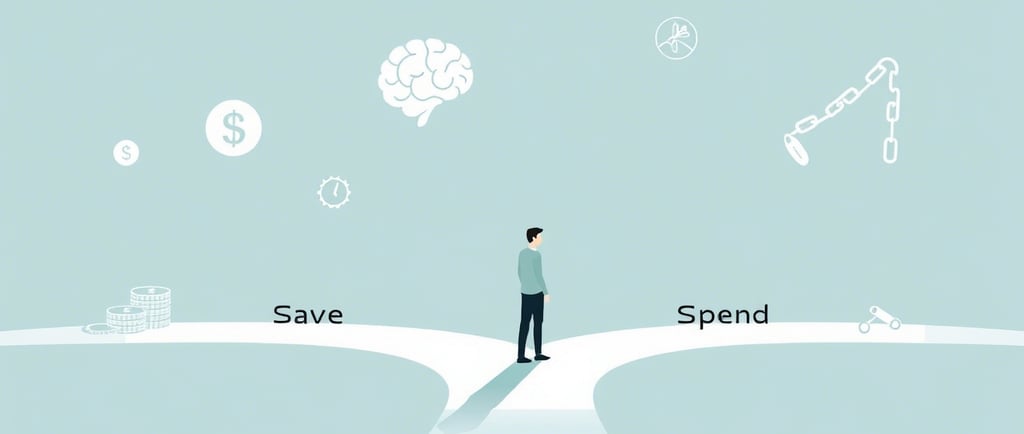The Psychology of Money: Why We Spend, Save, and Sometimes Self-Sabotage
Money isn’t just numbers—it’s emotion, behavior, and belief. If you’ve ever wondered why you make certain financial decisions that don't align with your best interest, you're not alone. Welcome to the world of money psychology. Understanding the psychological forces behind your spending and saving can help you gain control, reduce financial stress, and build lasting wealth.
5/9/20253 min read


1. Money Is Emotional Before It’s Logical
From childhood, we absorb beliefs about money—many of them emotional. Your upbringing, culture, and personal experiences shape how you feel about spending, saving, debt, and wealth.
Examples of emotional money behavior:
Retail therapy to cope with stress or sadness
Guilt spending to please others
Fear of scarcity even with a decent income
Understanding that your money habits are often emotional is the first step to changing them.
2. Your Money Scripts Are Running in the Background
Psychologist Brad Klontz coined the term “money scripts”—unconscious beliefs formed in early life that influence financial decisions in adulthood.
Some common scripts:
“Money is the root of all evil.”
“I’ll never have enough.”
“If I’m rich, people will hate me.”
“I deserve to treat myself now.”
These thoughts can lead to overspending, under-earning, or avoiding money management altogether. Journaling and therapy can help uncover and rewrite harmful money scripts.
3. The Pain of Paying (Yes, It’s Real)
Paying for things actually activates the pain centers in your brain. But here’s the twist: some payment methods hurt less than others.
Studies show:
Paying with cash = most painful
Paying with debit = moderate
Paying with credit or digital wallets = least painful
This is why people often overspend with credit cards—they don’t feel the loss of money.
Pro tip: Try using cash or debit for discretionary spending to heighten awareness and reduce impulse buys.
4. Present Bias: Why We Choose Now Over Later
Present bias is the tendency to favor immediate rewards over long-term benefits. It's why many people choose to spend $50 now instead of saving it for future wealth.
Even if you know long-term saving is better, the immediate dopamine hit of a purchase wins. That’s just how the brain works—unless you actively retrain it.
How to fight present bias:
Automate your savings
Visualize your future goals daily
Set up friction between you and impulsive spending (e.g., remove saved cards online)
5. Lifestyle Creep: The Silent Budget Killer
As income increases, so do expenses. It’s called lifestyle inflation—and it can rob you of wealth even as you earn more.
Examples:
Getting a raise, then leasing a luxury car
Moving to a bigger home with a bigger mortgage
Dining out more simply because “you can”
Combat it by:
Increasing savings rate with every raise
Maintaining modest lifestyle choices even as income rises
Tracking expenses regularly to detect inflation
6. Social Comparison: Keeping Up with… Everyone
In today’s social media world, comparison is constant. You see vacations, gadgets, luxury cars—and unconsciously, you begin to want and spend more, even if it's beyond your budget.
Remember:
What people post online is curated
Most people are financing their lifestyles
Financial peace is better than fake prestige
Practice gratitude and intentional living. Your goals are personal—not public.
7. Scarcity Mindset vs. Abundance Mindset
People with a scarcity mindset believe there’s never enough: money, time, opportunity. This leads to hoarding, fear, and stress. People with an abundance mindset believe that money flows, can be managed, and grown.
Scarcity says: “I’ll never get ahead.”
Abundance says: “I can always create more value.”
You can shift your mindset by:
Celebrating small financial wins
Learning and growing consistently
Avoiding fear-based financial media
8. Why We Self-Sabotage with Money
Sometimes we sabotage our own success. Why?
Fear of success
Impostor syndrome
Feeling undeserving of wealth
Anxiety around responsibility
This often shows up as procrastinating on bills, ignoring debt, or spending recklessly after a financial win.
Overcome it by:
Addressing emotional blocks
Building small habits of control
Working with a financial coach or therapist
9. How to Build Financial Self-Awareness
Self-awareness is your strongest tool. It lets you catch your behaviors before they become patterns.
Ways to build it:
Track your spending daily
Reflect weekly: “Why did I make that purchase?”
Use journaling prompts like “What does money mean to me?”
Awareness leads to conscious choices. And conscious choices lead to wealth.
10. Tools to Rewire Your Money Mindset
Here are some actionable steps:
✅ Use budgeting apps that show emotional triggers (like PocketGuard)
✅ Read books like “The Psychology of Money” by Morgan Housel
✅ Join support groups or subreddits focused on personal finance
✅ Practice delayed gratification (e.g., 30-day rule for big purchases)
✅ Automate everything you can: savings, debt payments, bills
✅ Surround yourself with people who support smart money behavior









